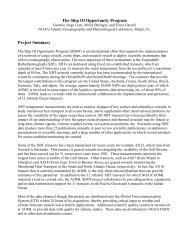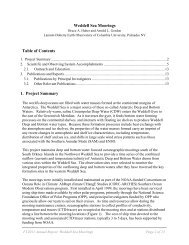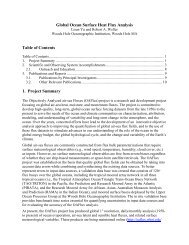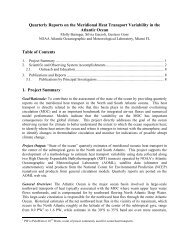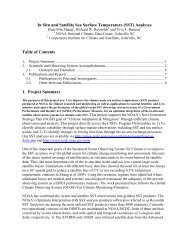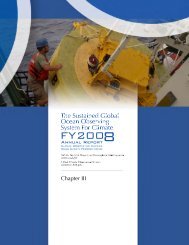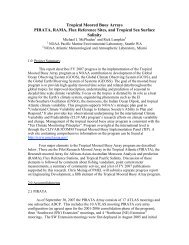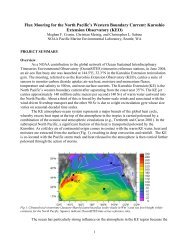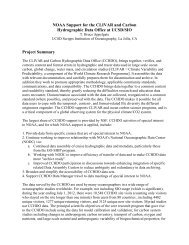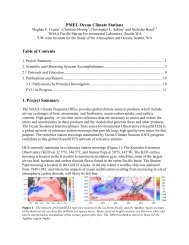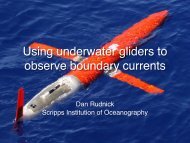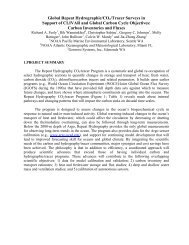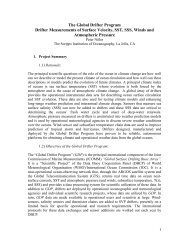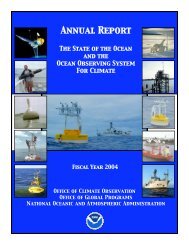GCOS Implementation Plan - WMO
GCOS Implementation Plan - WMO
GCOS Implementation Plan - WMO
Create successful ePaper yourself
Turn your PDF publications into a flip-book with our unique Google optimized e-Paper software.
<strong>Implementation</strong> <strong>Plan</strong> for the Global Observing System for Climate in Support of the UNFCCC<br />
(2010 Update)<br />
Action O36 [IP-04 O37]<br />
Action: Support data rescue projects.<br />
Who: Parties’ national services with coordination by IODE through its GODAR project.<br />
Time-Frame: Continuing.<br />
Performance Indicator: Datasets in archive.<br />
Annual Cost Implications: 1-10M US$ (30% in non-Annex-I Parties).<br />
The IODE and JCOMM should support projects that enhance the flow, quality control and overall<br />
management of ocean data in real time and, specifically the Global Temperature-Salinity Profile<br />
Program (GTSPP) and GOSUD.<br />
See Action O22.<br />
The IODE and JCOMM, in collaboration with specific national groups, should develop enhanced and<br />
more cost-effective telecommunication capabilities including, as feasible, two-way communications for<br />
dynamic control of instruments.<br />
Action O37 [IP-04 O38]<br />
Action: Develop enhanced and more cost-effective telecommunication capabilities, including<br />
two-way communications for dynamic control of systems, instruments and sensors.<br />
Who: Parties, coordinated through JCOMM.<br />
Time-Frame: Continuing.<br />
Performance Indicator: Capacity to communicate data from ocean instrumentation to ocean<br />
data centres.<br />
Annual Cost Implications: 1-10M US$ (50% in non-Annex-I Parties).<br />
5.4. Oceanic Domain – Integrated Global Analysis Products<br />
The purpose of the observing system described is to provide the information necessary to meet the<br />
needs of the UNFCCC. A fundamental set of products have been identified and developed by<br />
research and operation communities to meet these requirements. In addition, high-value products<br />
and services to stakeholders, decision-makers, and policymakers are emerging from an ongoing<br />
dialogue with the science community. This exchange will provide the guidance for the further<br />
development of the system.<br />
Ocean data analyses are important for supporting the testing of climate change models and<br />
evaluation of the ocean state/structure of predictions of future changes of the climate system. The<br />
comprehensive global networks, together with baseline and reference networks described previously,<br />
can provide the needed information, with particular emphasis on three-dimensional analyses,<br />
climatologies and time series.<br />
Ocean analysis, reanalysis and ocean data assimilation and forecasting systems are underway or<br />
planned in several nations, but it is important to enhance, sustain and coordinate the suite of such<br />
activities needed to meet the specific needs of the UNFCCC. Several groups are testing the capacity<br />
of ocean data assimilation systems to contribute to climate assessment, climate forecasting and<br />
climate analysis. There are two types of global reanalysis efforts: 1) high-resolution, but focused on<br />
the most recent satellite altimeter period; and 2) lower-resolution, mostly covering the atmospheric<br />
reanalysis period. A number of existing ocean assimilation/state estimation efforts participate in<br />
GODAE, a pilot project to demonstrate the impact and feasibility of operational oceanography and<br />
prediction, with several partners having specific interests in climate. Other research and pilot projects<br />
are also underway. Such efforts are essential to developing on-going systems capable of making<br />
products that address the needs of the UNFCCC.<br />
Several specific Actions are proposed to ensure continuous integrated ocean analysis products to<br />
address climate user requirements including those of the UNFCCC:<br />
OOPC, JCOMM, and IODE, in close collaboration with CLIVAR and WOAP/other research activities,<br />
should develop plans for the construction of climate-quality historical datasets for the oceanic ECVs,<br />
including estimates of variance and covariance statistics.<br />
101



